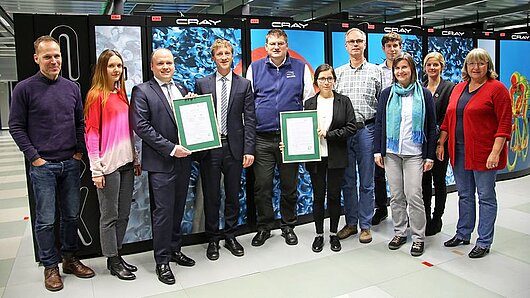High-Performance Computing Center Stuttgart

The internationally recognized certifications attest to the comprehensive steps that HLRS has taken to minimize its environmental impact across the entire organization, and provide frameworks that will guide its efforts to improve its sustainability even more in the coming years.
For a more detailed explanation of HLRS's sustainability policies and activities, see our environmental statement and sustainability report. (Documents are in German.)
"Because supercomputing unavoidably requires significant resources," said Prof. Dr. Michael Resch, Director of HLRS, "we decided several years ago that we need to do everything we can to minimize the environmental impact of our activities. Our ISO 14001 and ISO 50001 certifications show that we are on the right track to making sure that HLRS remains a sustainable resource for science, engineering, and all sectors of society."
ISO 14001 is an international standard for the development of an environmental management system in organizations. It provides guidelines for environmental management and demands that organizations commit to continually improve their environmental performance in the future.
At HLRS, this has meant implementing a comprehensive sustainability management system, covering topics including energy usage, resource consumption and disposal, and avoidance of activities that negatively impact the environment or human health. These efforts impact all levels of the organization, including:
Taking responsibility for HLRS's environmental impacts under ISO 14001 also means creating a work culture in which consideration of environmental sustainability is accounted for in actions and decision making at all levels of the organization.
ISO 50001 is an international standard for energy management systems, setting targets for improving energy efficiency in organizations based on their size and activity profiles. At HPC centers like HLRS, which require large amounts of power for the operation and cooling of their computers, this means committing to implement measures that will minimize carbon emissions and consumption of nonrenewable resources.
Although there are limits to the extent to which a supercomputing center can avoid energy consumption, HLRS has undertaken comprehensive efforts to maximize its energy efficiency. This has involved setting targets for energy usage, tracking actual energy consumption, and making infrastructure improvements to optimize energy efficiency.
HLRS began taking formal steps toward addressing its responsibility for sustainability in 2014 with a grant from the Baden-Württemberg Ministry for Science, Research and the Arts to start a project titled "Sustainability in HPC Centers." The effort has also been conducted in collaboration with the Baden-Württemberg Academy for Nature and Environmental Protection.
In the first stage of the project, HLRS developed a sustainability concept, conducted sustainability training for staff, and implemented a preliminary set of sustainability measures. After being renewed in 2017, the project focused more closely on defining what sustainability means at HLRS and began preparing for environmental and energy certifications.
The project supported the development of a comprehensive environmental and energy management system at HLRS that enables constant monitoring and avoidance of environmental impacts, provides sustainability guidance in decision making, trains staff in ways they can contribute to sustainability, and promotes the integration of sustainability at the University of Stuttgart and in the European HPC community.
For more detailed information about HLRS's sustainability management, see Sustainability & Environment.
— Christopher Williams